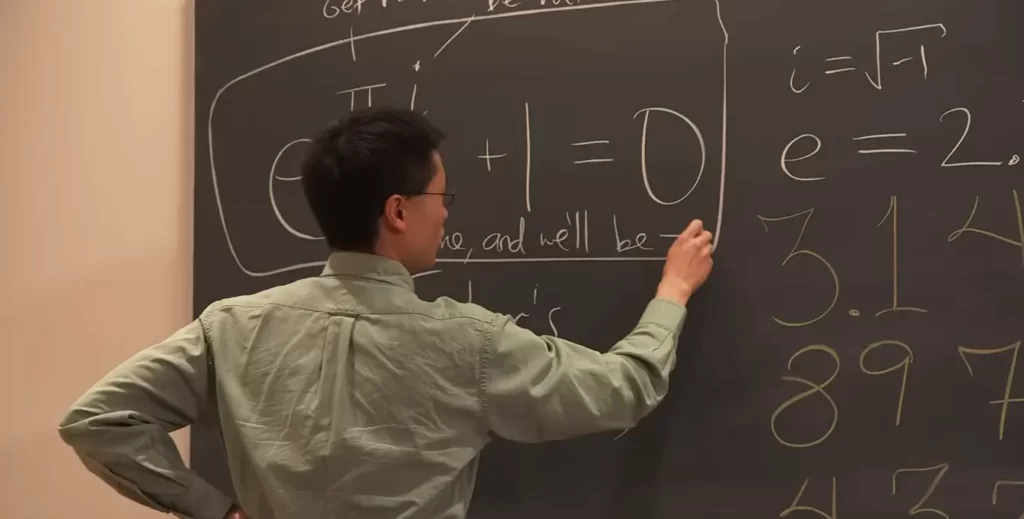Is Discrete Math Hard? – Navigating The Challenges

When it comes to Mathematics, many students find themselves divided over the question, “Is Discrete Math Hard?”
In the extensive guide, you’ll go on a journey about Discrete Math. Here, We’ll cover the following;
- Is Discrete Maths Hard?
- Reasons That You Should Learn Discrete Math.
- Studying Needed For Discrete Math.
- Simple Ways To Make It Easy.
So, Let’s Jump Right In,
Key Takeaway
- It is a branch of Mathematics that focuses on distinct, countable entities and plays a crucial role in Computer Science, Engineering, Cryptography, and various Scientific disciplines.
- Discrete Math encompasses topics like set theory, graph theory, combinatorics, number theory, and mathematical logic.
- A thorough understanding of fundamental ideas, such as sets, relations, functions, mathematical logic, group theory, counting theory, probability, and graph theory, is necessary for success in discrete mathematics.
- Discrete Mathematics is not just a theoretical field; It optimizes routes in GPS systems, encrypts data in cryptography, and analyses algorithms and data structures in computer science.
Table of Contents
Introduction And Definition Of Discrete Math:
Discrete Mathematics is a branch of Mathematics that deals with distinct, separate values or countable entities. Unlike continuous mathematics, which deals with continuous values like real numbers, discrete mathematics focuses on integers, graphs, sets, and logical statements.
This field is crucial in computer science, engineering, and other scientific disciplines.
1) Brief History of Discrete Math:
The roots of Discrete Mathematics can be traced back to ancient times when Mathematicians started grappling with combinatorial problems.
However, in the late 19th and early 20th centuries, Discrete Mathematics began to take its current form. Pioneers like Georg Cantor and Richard Dedekind significantly contributed to developing set theory.
This field continued to evolve throughout the 20th century, becoming increasingly relevant in Computer Science, Cryptography, and other Technological advances.
2) Topics In Discrete Math:
Discrete Mathematics cages a wide range of topics, including but not limited to:
- Set Theory: Mathematicians study sets and their properties, including operations like union, intersection, and complement.
- Graph Theory: Analysts use graphs to solve problems related to connectivity, networks, and object relationships.
- Combinatorics: Mathematicians study how to count, arrange, and choose objects, frequently applying them to probability and statistics.
- Number Theory: Mathematicians explore integers and their properties, applying them to Cryptography and coding theory.
Role Of Discrete Math In The Field Of Mathematics:
Discrete Mathematics plays a climacteric role in various areas of Mathematics and Science.
It is the foundation for Computer Science, Cryptography, and Information Theory.
It provides the theoretical underpinnings for Algorithms, Data Structures, and Computational Theory, making it an indispensable part of Modern Mathematics.
Discrete Math concepts are also indispensable in Optimization Problems and Operations Research. It provides the mathematical framework necessary for solving real-world problems with discrete components.
Difference Between Discrete Math And Other Fields Of Maths:
To appreciate why Discrete Math is considered harsh, it’s essential to understand how it differs from other branches of Mathematics. While Calculus and Algebra deal with continuous and continuous/discrete hybrid concepts, Discrete Mathematics focuses only on Discrete elements.
Discrete Math problems often involve counting, combinations, and logical reasoning.
This strong contrast with continuous Mathematics can make Discrete Math appear challenging, especially for those more comfortable with continuous concepts.
Is Discrete Math Hard? Why Is It So Hard?
Due to its abstract nature and priority on logic and problem-solving, Discrete Mathematics can be complicated. It frequently involves abstract ideas that some people may need to become more familiar with, like sets, proofs, and combinatorics.
However, the difficulty varies from person to person, and many find it painless with the proper preparation and practice.
Understanding and effectively utilizing the fundamental concepts of Discrete Mathematics are conditions for success.
Reasons Why Students Find Discrete Math Hard:

Discrete Mathematics is a formidable branch of Math. Several factors contribute to this perception.
1. It Is Different From Other Familiar Mathematical Concepts:
Discrete Math instructs you to abstract concepts and problem-solving techniques that differ enormously from the more typical arithmetic and algebra you’ve encountered earlier in your Mathematical voyage.
This harsh shift in thinking can be perplexing and problematic for some.
2. Cramming And Memorizing Will Not Work With Discrete Math:
In many Math studies, you can rely on memorization and formula-based problem-solving. However, Discrete Math requires a deeper learning of concepts and the ability to apply logical reasoning.
More than simply memorizing formulas will be required, making it a more intellectually insisting subject.
3. The Use Of Computational Algorithms Increases Its Complexity:
Discrete Math is often associated with intricate algorithms, specifically in graph theory and combinatorics. Understanding and implementing these algorithms can be daunting, requiring Mathematical insight and computational skills.
4. The Long Duration Of Study Involved:
Mastering Discrete Mathematics mandates boosted dedication due to its conceptual nature and the requirement for deep comprehension, making it more time-consuming than some other Math domains.
5. The Teaching Method Adopted:
The perceived difficulty of Discrete Math can be significantly affected by teaching methods. Suppose professors need help to clarify its involuntary aspects or the curriculum needs real-world applications.
You may need help relishing the subject’s relevance and sophistication.
Is Discrete Mathematics Important?
Despite its inherent challenges, Discrete Mathematics carries immense significance in diverse fields. Its far-reaching applications transit Computer Science, Cryptography, and Data Analysis.
Discrete Math enhances investigative skills and unlocks many career prospects, emphasizing its decisive role in shaping various industries and technological advancements.
Is Discrete Math Worth Taking?
Depending on your academic and professional goals, you must decide whether to enroll in a Discrete Mathematics course. The advantages outweigh the potential drawbacks. You gain vital, highly transferable problem-solving skills from Discrete Mathematics.
Moreover, it lays a strong foundation for various STEM (Science, Technology, Engineering, and Mathematics) fields necessary in today’s technology-driven world.
Suppose you aim for a career in Computer science or data analysis and other Technical Science fields. In that case, mastering Discrete Math is a valuable investment in your future success.
Things To Know Before Learning Discreet Math:
Before tackling Discrete Math, here are some paramount things to keep in mind:
1) What Level of Math Is It?
Discrete Mathematics is typically regarded as a Mathematics course at the Intermediate Level. Calculus and Linear Algebra are topics that fall between Introductory and Advanced Math.
Before delving into Higher-Level Mathematical subjects, it may be taken after completing Introductory Mathematics courses.
2) What Subjects You Study In Discrete Math:
Even though there are several different Topics In Discrete Mathematics, the following are some important subjects in Discrete Math;
2.1) Sets, Relations And Functions:
SETS: Collections of unique elements make up sets. They can have a finite number of elements or an infinite number of elements. Braces, a fundamental idea used in discrete math, denote sets.
Example
- The set of all natural numbers: {1,2,3,4,…}
- The set of all vowels in the English alphabet: {a,e, i,o,u}
- The set of all students in a class:{s1,s2,s3,…}
RELATIONS: Relations are connections or associations between components of two sets. Studies of the relationships between the components of various sets are done using relations, which can be displayed as tables, graphs, or matrices.
Examples:
- The relation “is less than” between the sets of natural numbers and natural numbers: {(a,b)∈N×N∣a<b}
- The relation “is equal to” between the sets of vowels in the English alphabet and the students in a class:{(v,s)∈{a,e, I,o,u} x {s1,s2,s3,…}| v= s1 for some i}
- The relation “is a parent of” between the sets of students in a class and the students in a class: {(s1,s2)∈ {s1,s2,s3,…} X {s1,s2,s3,…} | s1 is a parent of s2}
FUNCTIONS: A function from a set A to a set B is a relation between A and B such that every element of A is related to exactly one element of B.
In other words, a function is a relation that maps each element of its domain (setA) to exactly one element of its codomain (setB).
Examples
- The function that assigns to each natural number its square: f(n)=n2.
- The function that assigns to each vowel in the English alphabet its number of occurrences in the word “hello”: g(v)=∣number of occurrences of v in “hello.”
- The function that assigns to each student in a class their favorite subject: h(s)=s’s favorite subject
2.2) Mathematical Logic:
Mathematical Logic studies formal reasoning and logical structures. It involves propositional logic (dealing with statements and their truth values) and predicate logic (extending to relationships and quantifiers).
In Discrete Math, It is used to study the properties of Sets, Relations, and Functions. It is also used to study the correctness of algorithms and the design of Digital Circuits.
2.3) Group Theory:
Group theory in Discrete Mathematics is a branch of abstract Algebra that studies the properties of Mathematical Groups. Groups are sets equipped with a Binary operation (like Addition or Multiplication) and satisfy specific hypotheses.
Applications Of Group Theory:
- To Prove That A Graph Is Isomorphic To Another Graph.
- To Construct Algorithms For Solving Combinatorial Problems.
- To Study The Properties Of Error-correcting Codes.
- To Design Cryptographic Protocols.
2.4) Counting Theory:
An area of Discrete Mathematics called Counting Theory concerns the orderly counting of things. It is based on the product rule and the sum rule. It is used to address various issues in discrete mathematics and other disciplines.
How Counting Theory Is Used In Discrete Mathematics:
- To Prove That A Graph Is Connected.
- To Count The Number Of Spanning Trees In A Graph.
- To Analyze The Performance Of Algorithms.
- To Design Efficient Data Structures.
2.5) Probability:
The Probability of events occurring in a Discrete system is studied in Discrete Mathematics. A Discrete system has a finite or countably infinite number of possible outcomes.
Here Are Some Examples Of How Probability Is Used In Discrete Mathematics:
- To Analyze The Performance Of Algorithms, Such As Sorting And Searching Algorithms.
- To Design Efficient Data Structures, Such As Hash Tables And Binary Search Trees.
- To Study The Behavior Of Complex Systems, Such As Computer Networks And Social Networks.
- To Develop New Cryptographic Protocols.
Probability can be calculated by using formula are following:
Probability = Favorable Cases / Possible Cases x 100
2.6) Mathematical Induction And Recurrence Relations:
Discrete Math uses the Mathematical induction proof to demonstrate claims about natural numbers. It entails proving that a statement is valid for the simplest case, usually the smallest number, and proving that if it is valid for one number, it is also true for the next.
Recurrence relations are equations that model and address repetitive and iteration issues in Discrete Mathematics. They express sequences’ terms in terms of earlier ones.
For example, the Fibonacci sequence is defined by the following recurrence relation:
F(n) = F(n-1) + F(n-2)
with the initial conditions
F(0)=0 and
F(1)=1.
2.7) Graph Theory:
The study of Graphs, Mathematical constructions used to model pairwise relations between objects, is a subfield of Discrete Mathematics known as Graph Theory. In this context, vertices (nodes or points) are connected by edges (lines or curves) to form a graph. A network can also be used to describe a Graph. The study of Graph properties and their applications is known as Graph Theory.
Examples Of Graph Theory Problems:
- Finding The Shortest Route Through A Network Between Two Points.
- Finding the Network’s Minimum Spanning Tree.
- A Network’s Maximum Flow Can Be Found.
- Finding A Graph’s Independent Sets And Vertex Covers Coloring A Graph With The Fewest Number Of Colors.
Trees:
A Tree is a fundamental data structure in Discrete Mathematics comprised of nodes connected by edges without cycles. Trees are used because of their hierarchical structure and single-root node.
Applications in Discrete Mathematics,
- Representing Hierarchical Data Structures, Such As Binary Search Trees And Heap Trees.
- Analyzing Algorithms, Such As The Quicksort Algorithm And The Depth-first Search Algorithm.
- Designing Computer Networks And Other Distributed Systems.
2.8) Boolean Algebra:
The Mathematical system, known as Boolean Algebra in Discrete Mathematics, deals with Binary variables and Logic operations like AND, OR, and NOT. It is necessary for logic-based problem-solving, computer science, and the design of digital circuits.
Boolean Algebra is a vital tool for studying Discrete Mathematics and its applications in various fields because it enables the manipulation and analysis of logical expressions.
7 Reasons Why Discrete Math Is Not Hard For Some Students:

While Discrete Math is undoubtedly challenging for many, it’s important to note that some students find it more manageable and enjoyable. Here are Seven reasons why:
1. It Is Practical:
Discrete Mathematics frequently deals with issues from the outside world with valuable applications. It can become more relatable and less abstract if we see how it can be applied in different fields.
2. It Enables You to Think Mathematically:
Logic and proofs are underlined in Discrete Mathematics. This part of Discrete Mathematics may appeal to you if you like logically stringent proofs and conclusions.
3. Discrete Math Gives You An Added Advantage:
In disciplines like Computer Science, Data Analysis, and Cryptography, where Discrete concepts are pervasive, having a solid background in Discrete Mathematics can give an advantage.
4. It Is Exciting:
The difficulties presented by Discrete Math can be intellectually stimulating to some students. Complex problem-solving may be more satisfying than it initially appears to be.
5. Like Any Other Mathematical Concept, Attitude Matters:
Any subject, including Discrete Mathematics, can be made more approachable by having a positive attitude toward learning and a willingness to take on challenges.
6. It Depends On The Professor:
The quality of your Discrete Mathematics Professor can also affect how well the class goes. Your learning experience can be significantly improved by a knowledgeable teacher who clearly explains concepts and gives relevant examples.
7. It Depends On Your Background:
How challenging you find Discrete Math may depend on your Mathematical background if you have a solid background in subjects related to Logic or Algebra. Understanding the concepts might be simpler for you.
4 Reasons Why You Should Learn Discrete Math:
Even though Discrete Mathematics can be difficult, there are many compelling reasons to learn it:
1. Discrete Math Apples To Every Field In Mathematics:
It is an essential component of any STEM education because its ideas are fundamental to many mathematical disciplines and applicable to them all.
2. Discrete Math Concepts Are Backed By Mathematical Proof:
Discrete Math is based on rigorous Mathematical proofs, ensuring its validity, unlike some Mathematical concepts that rely on empirical evidence.
3. Discrete Math Does Not Rely Solely On Numbers Or Formulas:
It focuses on logical thinking and problem-solving, essential abilities outside Mathematics in Computer Science and Engineering.
4. It Deals With Real-Life Problems:
Discrete Mathematics is theoretical and has real-world uses, such as encrypting sensitive data and optimizing routes in GPS systems.
Do Programmers Use Discrete Math?
Yes, Discrete Math concepts are frequently used by programmers in their work. Discrete Mathematics is paramount to Algorithms, Data Structures, and Computer Science. Writing effective code requires a solid understanding of these ideas.
Is Discrete Math Used In Physics?
Even though Physics mainly deals with continuous phenomena, Discrete Mathematics still has some uses. For instance, Discrete Math is essential in Physics because Quantum Mechanics frequently uses Discrete states and Probabilities.
Read More About Astrophysics
Is Discrete Math Like Calculus?
Calculus and Discrete Mathematics are two different areas of Mathematics. Discrete Math is concerned with countable, distinct elements, while Calculus is concerned with continuous change and rates of change. They have various functions and employ various approaches to solving issues.
Is This Harder Than Calculus II?
Different people might find Calculus II easier than Discrete Math. Because of its conceptual nature, Calculus 2, which employs complex integration and differentiation techniques, may be more challenging for some students than Discrete Math. It ultimately boils down to individual preferences and strengths.
How Much Studying Is Needed For Discrete Math?

Discrete Math has a range of study requirements depending on your prior knowledge and the course level. Generally, allow considerable time for practicing, solving problems, and comprehending the underlying ideas.
1) Easy Methods Of Learning Discrete Mathematics:
Take into account the following tactics to make learning Discrete Mathematics more manageable:
2) Developing The Necessary Information And Skills:
Study Graph theory, Combinatorics, Proofs, Logic, and Sets. Utilize tools like textbooks, online courses, and tutorials to practice problem-solving and integral thinking.
3) Presenting Useful Techniques For Solving Problems:
Concentrate on learning Discrete Math specific problem-solving methods, like proof-writing and algorithm design.
4) Suggested Readings, Online Education, And Tutorials:
Add recommended textbooks, online courses, and tutorials to your course materials. These sources can offer additional practice problems and different explanations.
5) Plan The Schedule For The Semester Early On:
Make a study schedule for the entire semester, including designated study times for Discrete Math. Your understanding can be improved by developing regular, structured study habits.
6) Make Sure To Do Well On The Homework:
Assignments for homework are essential for improving the understanding of the subject matter. Take them seriously and ask for assistance if necessary.
7) Prepare For It Ahead Of Time:
To avoid excessive strain, study for exams and assignments far in advance. It allows for a thorough understanding of the material, effective time management, and reduces last-minute cramming.
8) Pick A Well-Reviewed Professor:
When choosing your course, choose a renowned professor known for their efficient teaching methods. These teachers can improve your educational experience by providing insightful knowledge, engaging lectures, and clear explanations.
9) Read The Book Before Skipping To The Problems:
In advance of approaching problems, organize and thoroughly understand the material to gain a solid understanding of the theory and concepts presented in the textbook. Using this method, you can more easily apply your knowledge to challenging exercises and real-world problems.
10) Prioritize The Material Given To You By The Professor:
Professors often provide essential guidance and insights. Pay attention to their reading suggestions and lectures.
11) Plan Your Schedule For The Class Earlier:
Include enough time in your overall academic schedule for Discrete Math. It’s necessary to balance your coursework if you want to succeed.
12) Take Homework Seriously:
Actively participating in assignments can improve your understanding of the subject and help you prepare for exams. By practicing, you can be sure you are prepared to answer exam questions successfully and confidently.
Simple Ways to Make Discrete Math Easy:
- Take it one step at a time and break each concept into manageable chunks rather than wasting time trying to understand everything.
- Begin by analyzing the rationale behind each formula or rule. Take term definitions seriously and explore ways to integrate these concepts into your comprehension.
- Recognize every discrete mathematics indication for each concept. Acknowledge each formula’s justification, then make a connection to workable solutions.
- Give Discrete Mathematics your full attention as you set time constraints and create daily tests for yourself.
- Don’t rely so heavily on schoolwork. Instead, go above and beyond and study with online textbooks, YouTube videos, and Discrete Math courses from websites like Udemy Or Boostmyclass.
Discrete Math Application:
- Computer Science – Algorithms, Data Structures, Graph Theory, Logic, Probability, Set Theory, Topology, etc.
- Engineering – Algorithms, Formal Languages, Programming Languages, Robotics, Signal Processing, Systems Analysis, etc.
- Mathematics – Geometry, Linear Algebra, Number Theory, Polynomials, Elementary Statistics, etc.
- Statistics – Bayesian Inference, Decision Theory, Estimation, Hypothesis Testing, Mathematical Programming, Markov Chains, Monte Carlo Simulation, Optimization, Sampling Distributions, Statistical Modeling, Time Series Analysis, etc.
Educational/Major Requirements:
The educational and significant requirements for Discrete Math vary depending on the institution and the specific program. However, some general requirements are typically required, such as:
- College Algebra.
- Trigonometry.
- Pre-Calculus.
- Calculus.
- Linear Algebra.
Some institutions may require students to take a Computer Science or programming course.
In addition to the general provisions, students who major in Discrete Mathematics will typically take courses in the following areas:
- Set theory.
- Logic.
- Graph theory.
- Counting theory.
- Probability.
- Recurrence relations.
- Algorithms.
Discrete Mathematics is a challenging but rewarding subject, and it is a valuable foundation for many different careers, including Computer Science, Mathematics, Engineering, and Finance.
Do Software Developers Use Discrete Math?
Yes, Discrete Mathematics concepts are frequently used in the work of Software Developers. They rely on their understanding of algorithms to create step-by-step instructions for tasks. Information can be managed and stored more effectively with knowledge of data structures.
Code is guaranteed to operate correctly by logic. These Discrete Math concepts are essential for developing software that works well and satisfies user requirements.
Additional Tips to Learn Discreet Math:
- Visit reputable websites that offer free online courses. You will learn the fundamentals of discrete mathematics in these courses.
- Use quality textbooks to gather reference material based on your professor’s advice. The ideal way to improve your online learning is through this. Studying texts is crucial for discrete mathematics.
- Consult with free online tutors who can offer guidance on clarifying any concepts you find challenging. Some reputable organizations provide free tutorial assistance to help you learn more.
- Watch videos on mathematics to improve your understanding. Videos can be a valuable addition to learning from printed text. Find websites where you can sign up to access free videos.
- Hire a qualified instructor so you can have enlightening conversations about topics you find challenging to comprehend.
FAQs:
1) Is Calculus A Prerequisite for Learning Discrete Math?
Calculus is not typically a condition for learning Discrete Math.
2) Which Is More Difficult, Continuous or Discrete Math?
Difficulty varies by individual, but Discrete Math is often considered more approachable than continuous Math like Calculus.
3) How Long Does It Take to Understand Discrete Math Fully?
Complete cognition of Discrete Math depends on your background and effort; it may take several months of study.
4) Do You Need Calculus To Learn Discrete Math?
Calculus is not required to learn Discrete Math; they are separate branches of Mathematics.
5) Is Math 108 Harder Than Statistics?
The difficulty of Math 108 vs Statistics can vary based on personal strengths and preferences.
6) Is Discrete Math The Hardest Math?
Discrete Math isn’t necessarily the hardest, as it depends on individual strengths and interests in Mathematics.
7) Is Discrete Math Harder Than Linear Algebra?
Discrete Math and Linear Algebra can be more or less complicated depending on a person’s strengths and preferences. Due to its abstract nature, some people might need help with Discrete Mathematics.
However, the mathematical structures of Linear Algebra might be more complex.
8) Is Discrete Math Hard In High School?
Discrete Math in high school can range in difficulty depending on the curriculum and your Mathematical experience. It may be challenging due to its conceptual essence and logical concepts.
Conclusion:
Discrete Mathematics is challenging, but its importance in various STEM disciplines cannot be exaggerated. While it may seem complex due to its conceptual nature, it becomes an effortless and rewarding subject with the right approach, dedication, and resources.
Whether you encounter it hard or not, Discrete Math is priceless for a successful profession in today’s technology-driven world. Adopt the challenges, and you’ll discover that Discrete Math opens porticoes to a world of opportunities.
You Might Also Like
I am a Natural sciences enthusiast with a profound passion for Biology, Chemistry, Statistics, and Physics. Completed more than 1055+ online classes and exams for the students. So they score high and stress less!
Discount
On Your First Order




